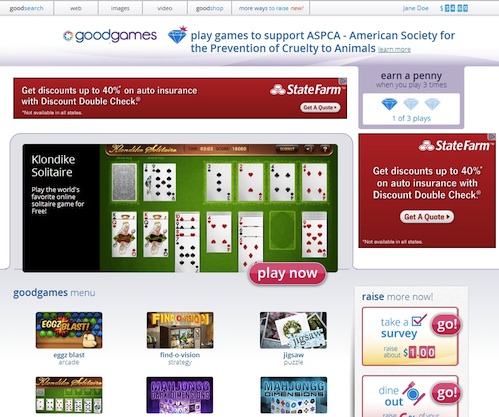Games -- they're fun, enjoyable and rewarding. When dissected down to their roots, the built-in learning process present in all games becomes clear. Whether they're designed and labeled as serious or casual, games take the pressure off of learning and giving, making them instrumental drivers of social impact.
During the last four years, the integration of gaming in non-game contexts has pervaded the business landscape internally and externally. Why? To motivate employees and customers to either obtain skills, solve problems or consistently use a product or service.
The health and green sectors are using this tactic to adopt healthier life habits.
Omada Health's Prevent program, uses wireless home monitoring systems and gamification elements to reinforce healthy living in people predisposed to diabetes. When Aetna incorporated Mindbloom's Life Game platform to help employees and customers manger their physical conditions, members visited the site four times a week. The green company Recyclebank increased recycling by 20 percent and reduced carbon emissions using gamified designs.
The game developer Pixlwise is taking the convergence of gaming, education and social change a step further, and creating a fun, story-driven community built around interactive games that teach real-world skills necessary to succeed in the workforce and in entrepreneurial endeavors.
Pixlwise Co-Founder Ced Funches started Pixlwise to help people who are unemployed take business into their own hands.
"I've been unemployed before, and it can feel debilitating," shared Funches.
Unemployment can lead to embarrassment for 'not succeeding, for not having. And even with all the technology available to us, it doesn't benefit everyone. Technology benefits the people who understand it, if you don't understand you're told you're just not trying hard enough and really made to feel inadequate. That's why people give up and I think we can change that.
The Pixlwise team wants to reinforce learning and most importantly retention. By connecting addictive game-based mechanics with skill-based learning, they're cultivating an interactive learning environment for players who might otherwise have little to zero chance at becoming acquainted with new skills, concepts, tools and a helpful community.
"If you've worked in construction for 10 years, but haven't had a job in four years, you need to learn new skills to survive in this new economy," said Funches. "We're using games to introduce people in this kind of situation back into the workforce and ultimately into small business ownership."
While Pixlwise builds games to take the pressure off learning, the online game provider Goodgames takes the pressure off giving. Through Goodgames, online gamers can now give back to the nonprofit or school of their choice when playing a variety of popular games from Arkadium, creators of the largest library of causal games in the world.

"We let you play for the cause that's most important to you, and we have over 109,000 charities that people can choose from right away," shared Scott Garell, CEO of Goodsearch, parent company of Goodgames. "Why wouldn't you do this? If you're going to play games anyway, why wouldn't you want to give back?"
With casual gaming showing no signs of slowing down in the market, Garell is hoping to make gaming synonymous with social good.
"According to NewZoo, over 50 million hours a day are spent playing casual online games in the U.S, said Garell. "If all of those hours switched to Goodgames, we'd donate over $1 Billion annually to America's causes to help find a cure for cancer, buy books for schools, get dogs and cats adopted, clean up our oceans, and send children with disabilities to summer camp."
As social media and emerging technology has proven in recent years, a little done by a lot of people can provide a great amount for many. No pressure added.
